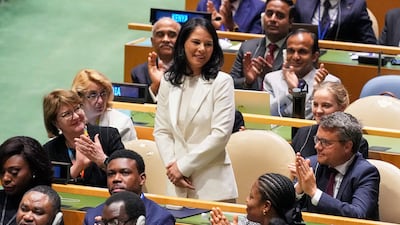Former German foreign minister Annalena Baerbock was elected president of the UN General Assembly on Monday, despite opposition from Russia.
Ms Baerbock, 44, won with 167 votes in a secret ballot, with 14 abstentions. Russia had pushed for the secret vote in a last-minute challenge, but her appointment was widely seen as a formality given she was the only candidate.
Ms Baerbock who appeared before the assembly to discuss her candidacy on May 15, was criticised by Russia’s deputy UN ambassador Dmitry Polyansky for her "incompetence, extreme bias and lack of understanding of the basic principles of diplomacy.”
Mr Polyansky also accused Ms Baerbock of having pursued an “anti-Russia policy," which he said gave Russia reason to doubt that as General Assembly president she would be "able to act in the interests of peace and dialogue.”
The Green Party politician, who needed only a simple majority, will assume the one-year post on September 9, before the 80th annual high-level gathering of world leaders at the UN.
Ms Baerbock will be the fifth woman to preside over the UN General Assembly in its nearly 80-year history, and the first European woman to hold the post.
The one-year presidency of the General Assembly rotates by region.
Unlike past presidents, who largely focused on protocol, she vowed to tackle bureaucratic inefficiencies, boost transparency and strengthen the assembly’s voice in choosing the next UN secretary general.
"My door will always be open for everyone – better together," Ms Baerbock said after her election, emphasising a commitment to "trust-based dialogue" with all member states.
She also stressed the importance of including input from all regions and groups in the reform process.
“This organisation requires adequate, reliable funding, and at the same time, we need to increase the efficiency and effectiveness of the entire system,” Ms Baerbock said.
The UN General Assembly, as the organisation’s most representative body, has taken center stage in responding to the wars in Ukraine and Gaza. This is due to the Security Council’s inability to act, as Russia has used its veto power to block measures on Ukraine, while the US has done the same regarding Gaza.
During her tenure as Germany's foreign minister, Ms Baerbock faced criticism for her strong pro-Israel stance during the Gaza conflict, with opponents accusing her of echoing Israeli government rhetoric.
"Of course, self-defence means not only attacking terrorists, but destroying them," she said last year. "When Hamas terrorists hide behind people, behind schools, we do not cower in the face of it. Then civilian places can also lose their protected status because terrorists abuse it. That is what Germany stands for, and for us that means the security of Israel."
Ms Baerbock's term as General Assembly president will test whether she can translate her reformist talk into tangible changes at the UN.


